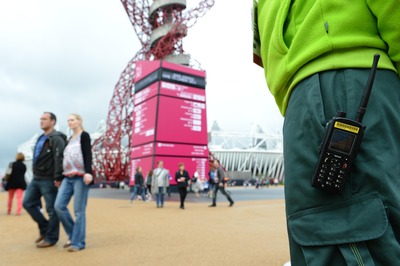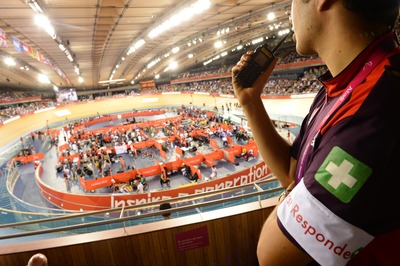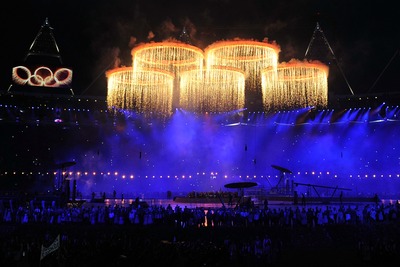An Olympian challenge
No other event rivals the Olympic Games when it comes to critical communications needs. With Japan now awarded the 2020 summer Games and the 2014 winter Games in Russia fast approaching, it’s timely to look back on London’s 2012 Games to see how its communications needs were handled.
The northern summer of 2012 marked a special period in the history of London as it played host to the Olympic and Paralympic Games. With record ticket sales of 11 million, 10,500 competitors taking part and an estimated global audience of 4.8 billion, the eyes of the world were on this sporting spectacular.
Facing a monumental logistical challenge, the London Organising Committee of the London 2012 Olympic and Paralympic Games (LOCOG) recognised the importance of having a critical radio communications network from the outset. With about 200,000 members of staff and volunteers working from locations in and around London, as well as in satellite regions across Great Britain, mobility, redundancy and security were critical, as were strategic partners with experience in delivery of complex and large-scale programs.
Used by more than 300 organisations including the police, fire and ambulance services, the Airwave UK Network is based on the TETRA technology standard and is renowned for its reliability, security and high-quality voice communications. It is viewed by London’s Metropolitan Police Service as the single most important IT system in terms of maintaining safety and security, and is part of the critical national infrastructure.
A unique challenge
LOCOG signed a contract with Airwave UK in 2008 for the construction and operation of a separate private mobile radio (PMR) network called ‘Apollo’, which would enable seamless communications between users, managers and control room staff across diverse functional areas such as events organisation and logistics, security and transport. For Airwave UK, this meant designing, delivering and operating a brand new stand-alone network that would serve some 18,000 Games officials and volunteers.
At the same time, Airwave UK had to ensure that ‘business as usual’ service levels were maintained on its existing public safety network and signed a second contract with the government’s newly created Olympic Security Directorate (OSD) to increase the functionality and capacity of the existing network. However, the two networks were to operate separately to ensure they remained secure and efficient.
Given that the Games were the largest peacetime logistical and security operation ever seen in Great Britain, scoping the radio communications requirement presented Airwave UK with a considerable challenge. LOCOG was a young and evolving organisation and also had a unique set of requirements that proved subject to change as the program progressed. Moreover, very few networks are built and commissioned in such a short period of time set against so many unknowns.

Airwave UK, LOCOG and the Olympic Delivery Authority (ODA) worked in close partnership to assemble a strong team operating within a very tight program delivery structure, with the company establishing a program office at LOCOG’s headquarters. Key responsibilities for the program office included: change management; risk and issues management; document management; and primary formal day-to-day interface between the company and LOCOG for aspects such as document submissions and approvals.
A team effort
The program for LOCOG comprised three projects. The first was a mobilisation project that took six months to complete and included project documentation and clarification of terms of reference as well as establishing a formal risk management and governance structure. Two projects then ran simultaneously throughout the program: network construction and managed services. The latter encompassed aspects such as end-user equipment (approximately 18,000 items of radios and accessories of different types), plus establishing the service management embracing all of the related processes, establishment of radio distribution rooms and necessary service support.
In order to address the difficulties in scoping requirements, Airwave UK scheduled requirement capture sessions directly with all of the individual functional areas within LOCOG. This enabled it to establish the baseline fleet map and assess user needs. The fleet map is a critical part of a radio service and details the structure of the various groups of radio users, as well as the features and functionality they have. The company also established the types of radios LOCOG would require for each type of user. These requirements were then documented in a clear and precise manner.
Airwave UK had to be just as diligent in mapping out its service management processes. Holding workshops to go through every single one of its service management processes with LOCOG, workflow charts illustrating each step of a process were developed to expedite the approvals process and ensure buy-in from key stakeholders.
Brand protection was also a key issue, with Samsung owning the handheld portable communications devices category. To address this, Airwave UK demonstrated how stickers could be used to cover up manufacturers’ logos on radios to meet the brand protection requirements of LOCOG and the International Olympic Committee (IOC).
Building a resilient and secure network
Airwave UK planned and developed an all-embracing service at the core of LOCOG’s critical radio communications strategy. The Apollo Network was capable of supporting 18,000 simultaneous users, had between 300 and 400 channels and all calls were encrypted. Locations of masts were kept secret, as were the whereabouts of network operations centres that controlled both the Apollo and the Airwave UK Networks during the Games.
Running live and ready for service from May 2011, more than a year before the opening ceremony, Apollo was initially available to support a minimum of 10,000 radio handsets, 2000 vehicle-based radios and 350 desktop radios (primarily for use in control rooms for dispatch and the monitoring of talk groups). The service covered Games venues in London including the Olympic Park in East London and supported satellite sites in remote locations such as Cardiff, Weymouth and Portland, Glasgow and Manchester.

Considerable resilience was built into the Apollo Network, with many of the technical components duplicated. An additional switch centre was deployed to maintain service in the unlikely event that the primary switch failed. Dual transmission links, comprising ground-based and microwave circuits, linked all of the radio sites to one another and provided resilience should any one radio site fail. Airwave UK also provided a significant on-site presence during the Games and set up radio distribution rooms at each of the Games venues managing radios for the venue-based staff and providing training, fault diagnosis, repair and radio swap out for seamless radio communications. The radio service design included remote deactivation should they fall into the wrong hands.
From June 2011, Apollo supported 45 ‘test events’ conducted in stages to ensure that LOCOG and its partners had everything in place. The test events included beach volleyball on Horse Guards Parade, equestrian competitions in Greenwich Park and the London to Surrey 140-kilometre bicycle race, when an aeroplane followed the riders, relaying the signal where there were gaps between masts. These test events provided LOCOG and Airwave UK with the chance to optimise and refine the service, as well as ensuring that contingencies were in place for worst-case scenarios.
Airwave UK also drew on its experience of event management to ensure that processes and procedures were fit for purpose and that the right people were in the right place at the right time. As part of this, the Joint Action Group (JAG) was established, which matched the decision-making authority and responsibility of the company’s executive committee during Games time to address any issues raised and deal with them promptly. JAG commenced operations seven days prior to the opening of the Games and operated on a 24/7 basis.
With another major challenge presented in the form of the 70,000 volunteers recruited by LOCOG, who were not at all familiar with two-way radios and how they work, Airwave UK produced a substantial amount of training materials. LOCOG was largely able to deliver this training on a ‘train the trainer’ basis, with specific materials designed for each type of radio and delivered with an underpinning lesson plan. The company also monitored radio user training issues both during the test events and the Games to ensure successful radio usage. LOCOG and the company worked together to reduce the impact on network capacity by promoting good radio user etiquette and reducing non-essential ‘airtime’.

Winning performance
Airwave UK delivered the service to LOCOG 14 months ahead of the Games. The coverage, security and resilience provided by the Apollo Network enabled LOCOG staff and volunteers to communicate confidential information without fear of interception and to remain in contact even if other networks may have overloaded or failed.
A flexible and responsive approach proved vital in successfully meeting program change requests. For example, it was initially agreed that Airwave UK would position its radio sites as close as possible to buildings to maximise potential radio coverage and, where possible, avoid the need for ‘special coverage’ (ie, in-building) solutions.
Airwave UK also delivered bespoke solutions to provide radio coverage via ground-based vehicles and aircraft for travelling events such as the road cycle race and the torch relay. Apollo successfully handled more than 800,000 radio calls during the busiest day of the Games and 45,000 radio calls during the busiest hour.
As well as staffing the radio distribution rooms, Airwave UK employees volunteered to support their customers at three Muster Briefing and Deployment Centres, which were set up by the Metropolitan Police Service for their officers and those police forces providing mutual aid to the Games. And the company deployed a significant number of engineers and support staff in central London and near to Games venues to provide daily monitoring of the network and be ready to respond to any issues with interference or problems that might arise - although these were few and far between.
When the London 2012 Olympic and Paralympic Games celebration parade concluded outside Buckingham Palace on 10 September 2012, the systems that Airwave UK and LOCOG put in place played a vital role in ensuring that the Games were safely delivered and that the public had a secure and enjoyable experience.
Wireless networks for mine management
Today's fleet management applications form the foundation for a future where driverless...
Wireless networks for mine management
Today's fleet management applications form the foundation for a future where driverless...
Interoperability for Tasmania's emergency services
Tasmanian police, fire and ambulance services can now communicate directly with each other,...



